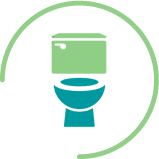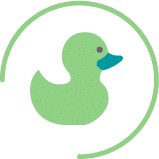
Tackle that trickle
Why act?
- A tap dripping at one drop per second can waste 1,550 litres of water per year
- A leaking toilet can use up to 45,000 litres of water in a week
- Leaks can cause secondary problems like dampness
Action
Get a plumber to fix leaks or get a book and some tools and go for the DIY approach.

Go with the flow
Why act?
Almost 33% of water that comes into your home leaves via the toilet. This means 33% of all the expensive water treatment getting it up to drinkable quality before it gets to your house is not needed. In addition to this when the water leaves via the toilet it is treated as foul using many more chemicals and energy even if that particular flush was just a piece of tissue.
Actions
- Never dispose of tissues and cotton wool down the toilet. As well as being wasteful of treated water they can clog the pipes.
- Do you need to flush the toilet after every pee? Maybe at bedtime or before going out every one in the house could make a ‘toilet stop’ and just flush once.
- If you need to buy a new toilet get one with a dual flush.
Fact
An average household will save 17,250 litres of water a year by halving the number of flushes.

Tanks a lot
Why act?
The average toilet tank holds about 9 litres of water. This much water leaves your house every time you flush the toilet.
Action
Take a 1 litre plastic bottle or 2 half-litre bottles. Remove the labels and fill the bottles with water. Place the bottles into the toilet tank taking care that they will not interfere with the toilet mechanism. Now every flush will use 1 litre less water. Wine bottles work well but they are only 0.75 l. Alternatively a large stone can be used. If you don’t have room for the above fit a special ‘Save a flush bag’ which will go into any toilet even one that already has a dual flush.
Fact
This action will save 1 litre per flush, that’s about 3,500 litres per year

Scrub a dub dub
Why act?
- Washing dishes with the tap running can use 100 litres of treated water. This costs even more money if it has been heated. Filling the washing up bowl you might use only 9 litres per day.
- Dishwashers use between 20-55 litres per load.
- Washing machines use between 70-120 litres per load.
Actions
- Do small amounts of dishes by hand and always use a washing up bowl.
- Never pre rinse dishes for the dishwasher under running water
- Make sure the dishwasher or washing machine is full before using.
- Does that clothing really need washing? Sometimes a damp cloth will do the job. By only washing clothes when needed, they will keep their new look longer.
Fact
By using the dishwasher or washing machine 1 time less each week you could save over 7,500 litres of water each year plus energy on your electricity bill and wear tear on the machine.

Facin the basin
Why act?
Letting the tap run whilst you brush your teeth for 3 minutes in the morning and three minutes at night can waste between 50 and 130 litres of water per day, that’s 350- 910 litres per week or 47,500 litres a year! Shaving can use another 50 litres every time.
Actions
- When washing, run the water at low force to wet your skin and soap. Turn off the water whilst you wash and turn it back on to rinse. Or fill the basin.
- Run the tap at low force to wet your toothbrush and turn the tap off whilst you clean you teeth. Fill a glass to rinse you mouth.
- Run the tap at low pressure whilst shaving or fill the basin.
Fact
The above actions can easily reduce your washbasin water use by 85% and could save 50 litres per day. That’s over 1,800 litres per year with a few simple changes.

Squeaky clean
Why act?
A bath can use 80 litres of water, a four-minute shower uses between 40 and 60 litres.
Actions
- Take more showers and less baths
- Time the length of your shower and see if you can reduce it to 4 minutes or less.
- Do you really need a shower every day? Try having a wash instead sometimes.
Fact
The above actions will definitely save you money especially if you use electricity to heat your water.

All bottled up
Why act?
On average 100 cups of clean water are wasted each time we let the tap run waiting for the water to go cold. Running your tap for one minute can waste 22 litres of treated water. If you live in a town or city the chances are this water will be treated as sewage so that is a waste of energy to treat it twice as well as a waste of water.
Action
Keep a plastic bottle full of water in the fridge. Although it takes some energy to cool the water this is much more efficient than letting the tap run.
Fact
If you have been running the tap like this for one minute a day then taking this action could save3000-8000 litres of water per year. You really can make a huge difference from very small changes!

WATER EXPLORER
A FUN, INTERACTIVE and FREE online educational resource engaging 8-15 year olds across 11 different countries to learn about water issues and develop the confidence to ACT on them.
Students navigate our custom online platform, completing a series of WATER CHALLENGES, and benchmark their progress interactively with their peers nationally and internationally.
TESTIMONIALS:
Water explorers is a fantastic global programme that helps raise awareness of water conservation in schools. The comprehensive resources are child friendly and engaging and the children love completing challenges and seeing their points add up as they do so. As a teacher all the resources are provided for you which makes the programme very easy to implement in the classroom and the Water Explorers team are always there to offer help and advice. My class have gained so much from participating in this programme aside from a deeper understanding of conservation issues: teamwork, leadership and the confidence to present their work to others are just some of the many benefits I have seen. The programme links well with the Green Schools theme of Water and it has been a very beneficial programme for our school this year. I would highly recommend the Water Explorers programme for other schools!
Sharon Murphy- Teacher – Scoil Bhríde, Cork.
Since our school signed up to the Water Explorer programme, it really has been an education – for all of us. We found ways to reduce our water footprint at school, and pupils have also spread that knowledge far and wide into their homes and the local community. As part of the programme, pupils get to go online and watch their progress. It increases their awareness of this global issue. We would really encourage other schools in the area to get involved and to become Water Explorers!
Paula Mc Dermott- Teacher- Scoil Éanna, Monaghan.
Not only have we found ways to reduce our water footprint at school, but pupils have also spread that knowledge far and wide into their homes and the local community. As part of the programme, pupils get to interact online not only with their peers in schools from other parts of Ireland, but also as far as Bermuda and South Africa. We would really encourage other schools in the area to get involved and to become Water Explorers!
Ann Marie Hearne- Teacher- Castlebridge National School, Wexford.


